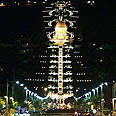
The UNESCO World Heritage Committee determined on Tuesday that the Bahai shrines in Haifa and in Akko are official World Heritage Sites. The declaration, which was made in Quebec, Canada is expected to bring a significant rise in tourist-based income to the city of Haifa. Just last year, 600,000 people visited the Bahai Gardens.
Statistics gathered at the Haifa Tourist Office show that 43% of the tourists in the city stated that the gardens were their main reason for visiting the city.
According to Albert Lincoln, secretary-general of the Bahai International Community, investment, establishment and planning costs for the gardens in Haifa reached $250 million and maintenance costs $4 million a year.
Money for building the site comes solely from members of the Bahai religion. This is since the religion refuses to accept money from a person who is not of the Bahai faith and this is also the reason why entrance into the gardens is free of charge.
The Bahai religion was established in Iran in 1862. Its believers support the unification of religions and world peace. They preach equal rights amongst men and women, the dispersion of knowledge, education around the world and the creation of one worldwide community based on justice and equality. They Bahais don’t have priests or set rituals. The most holy site for people of this faith is their founder, Baha’u’llah’s grave in Akko.
This year, 27 sites made the UNESCO list. Amongst them are the Malaysian historical cities of Malacca and George Town, the ancient city of San Miguel in Mexico and the San Marino Historic Center.
Until now, UNESCO has placed numerous Israeli sites on its World Heritage list. These include, the Old City of Jerusalem, the White City of Tel Aviv, Masada, the Old City of Akko, the Incense Route in the Negev and the Biblical Tels of Megiddo, Hazor and Beersheba.















